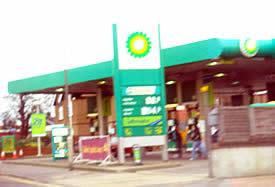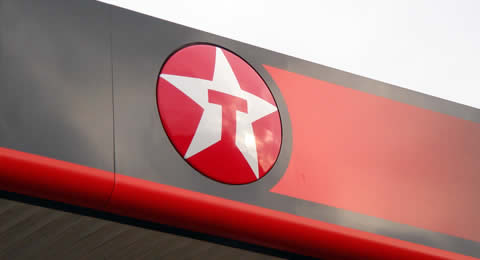An explanation of Fuel Octane ratings.
"Da Do RON RON"
 Premium or Super? Should you try one of the newer 100+ octane fuels? What about an octane boosting petrol additive?
Premium or Super? Should you try one of the newer 100+ octane fuels? What about an octane boosting petrol additive?
Does using a petrol with a higher RON improve performance or fuel economy?
TorqueCars will provide some answers and help you to decide what you should put into your tank. The old saying "you are what you eat" can also apply to what your car drinks.
Petrol is a complex mixture of over 300 different chemical compounds, mainly hydrocarbons ( compounds that contain only carbon and hydrogen). Petrol doesn't have a fixed composition but it is graded according to its performance in a test engine, which is where Research Octane Numbers come in. It's sometimes also called the Octane number or Octane rating, but beware, these terms don't always refer to RON. See table below. If you are reading an article from the USA the numbers quoted will refer to the AKI (Anti Knock Index).
RON and Engine Knock.
The Research Octane Number or RON is a measure of how good a petrol is at resisting engine knock. To understand what this means for our engines and our choice of fuel we need to look more closely at engine knock.
Ideally, during the ignition stroke the flame initiated by the spark plug should spread evenly across the cylinder consuming all the fuel and pushing the piston down in one smooth movement. In practise the high pressure and temperature in the cylinder can cause fuel in the far reaches of the cylinder to ignite spontaneously. These ill timed explosions place uneven pressure on the piston resulting in a jerky motion rather than a smooth piston stroke. This is known as engine knock and it causes a distinctive 'pinking' noise, more seriously in the long term it damages the pistons and can lead to engine failure. The higher the compression ratio of the engine the more likely engine knock is to occur.
Traditionally petrol was graded according to its performance in a single cylinder variable compression test engine. Fuels were compared to a test mixture of iso-octane (which is good at resisting engine knock) and heptane ( which is poor at resisting engine knock). 98 RON petrol would cause engine knock at the same compression ratio as a 98% iso-octane 2% heptane mixture.
Modern RON tests use computerised apparatus and the method has been refined so fuels with a RON greater than 100 can be assessed, but the basic principle remains unchanged.
| Abbreviation | Definition | Notes |
| RON | Research Octane Number | UK, Europe, South Africa & Australia |
| MON | Motor Octane Number | Motor sport applications. Measured under more severe conditions than RON (higher revs etc). Usually 8-10 units lower than the RON. |
| RdON | Road Octane Number | Average of RON & MON. Usually 4-5 units lower than the RON. USA, Canada |
| AKI | Ant Knock Index | Average of RON & MON. Usually 4-5 units lower than the RON. USA, Canada |
| PON | Pump Octane Number | Average of RON & MON. Usually 4-5 units lower than the RON. USA, Canada |
| (R + M )/2 | Average of RON & MON. Usually 4-5 units lower than the RON. USA, Canada | |
| Octane number, Octane rating or octane | Could refer to any of the above, if you can work out which country the article was written in you should be able to work it out. |
With a modern engine management systems you are unlikely to hear engine knock even if your fuel isn't fully meeting your engine's octane requirements. Knock sensors in the engine detect the first signs of engine knock and takes measures to prevent it such as adjusting the engine timing. This prevents engine damage but can result in reduced performance and fuel economy. Use our easy mpg calculator to work out your fuel consumption.
So is the answer to just use the highest RON fuel available? Not necessarily. If the RON of your petrol is high enough to completely suppress engine knock then moving to a higher RON fuel will not improve performance or fuel economy. RON is not a measure of how 'powerful' a fuel is. Higher RON fuels are also more expensive. Your car manual should recommend the optimum RON fuel for your car. My Audi manual recommends 98RON, 95 RON can be used with a slight loss of power under heavy driving conditions (eg heavily loaded, high revs), the power loss is due to the engine management system adjusting to avoid engine knock. In an emergency 91 RON can be used but only at 'moderate engine speeds and a light throttle.'

Unless a higher RON petrol comes with hard evidence that it has other properties that will increase power or fuel economy then you're better off sticking to the recommended RON. The only time I would be tempted to splash out on a slightly higher than recommended RON petrol would be for a track day when the car is being driven at full throttle.
The bottom line is that RON is a measure of how effective a petrol is at resisting engine knock. It tells us nothing about power or fuel economy. Over dosing on octane will only dent your pocket.
Please Check out my YouTube channel, we're regularly adding new content...
PLEASE HELP: I NEED YOUR DONATIONS TO COVER THE COSTS OF RUNNING THIS SITE AND KEEP IT RUNNING. I do not charge you to access this website and it saves most TorqueCars readers $100's each year - but we are NON PROFIT and not even covering our costs. To keep us running PLEASE Donate here
If you liked this page please share it with your friends, drop a link to it in your favourite forum or use the bookmarking options to save it to your social media profile.
Feedback - What do You Think?
Please use our forums if you wish to ask a tuning question, and please note we do not sell parts or services, we are just an online magazine.
Help us improve, leave a suggestion or tip
Please watch this video and subscribe to my YouTube channel.

 Click to accept YouTube Cookies & Play.
Click to accept YouTube Cookies & Play.